-
 Bitcoin
Bitcoin $84,319.5126
-1.66% -
 Ethereum
Ethereum $2,315.8053
-1.94% -
 Tether USDt
Tether USDt $0.9989
0.00% -
 XRP
XRP $2.1976
-0.46% -
 BNB
BNB $606.2756
-0.49% -
 Solana
Solana $138.4371
3.69% -
 USDC
USDC $0.9999
0.00% -
 Dogecoin
Dogecoin $0.2085
3.22% -
 Cardano
Cardano $0.6535
-0.42% -
 TRON
TRON $0.2278
1.06% -
 Chainlink
Chainlink $15.2638
1.13% -
 Litecoin
Litecoin $126.3514
1.80% -
 Avalanche
Avalanche $22.4744
3.31% -
 Stellar
Stellar $0.2857
-0.14% -
 Sui
Sui $2.8282
-0.69% -
 Shiba Inu
Shiba Inu $0.0...01454
3.76% -
 UNUS SED LEO
UNUS SED LEO $9.1490
1.44% -
 Toncoin
Toncoin $3.3850
-2.58% -
 Hedera
Hedera $0.1987
2.81% -
 Polkadot
Polkadot $4.9755
3.86% -
 MANTRA
MANTRA $7.4528
1.11% -
 Hyperliquid
Hyperliquid $20.0394
3.90% -
 Bitcoin Cash
Bitcoin Cash $297.6128
2.15% -
 Ethena USDe
Ethena USDe $0.9995
0.03% -
 Dai
Dai $0.9997
0.00% -
 Bitget Token
Bitget Token $4.1235
4.48% -
 Uniswap
Uniswap $8.0176
2.12% -
 Monero
Monero $209.7810
-2.88% -
 NEAR Protocol
NEAR Protocol $3.0911
4.11% -
 Aptos
Aptos $6.1884
8.85%
What is the consensus mechanism of Metadium (META) currency?
Metadium's hybrid consensus mechanism combines Proof-of-Work with Difficulty Adjustment, providing enhanced decentralization, security, and energy efficiency.
Jan 02, 2025 at 06:36 pm
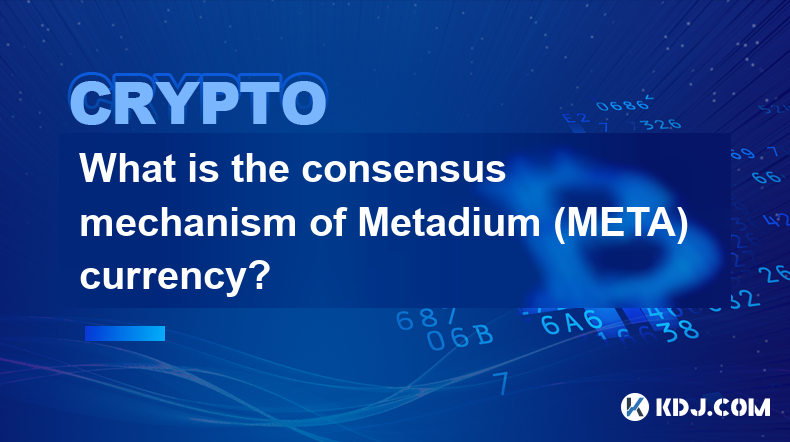
Key Points:
- Overview of Metadium (META) Currency
- Metadium's Consensus Mechanism: Proof-of-Work (PoW) with Difficulty Adjustment Algorithm
- Benefits of PoW Consensus
- Drawbacks of PoW Consensus
- Alternative Consensus Mechanisms for Metadium
- Frequently Asked Questions (FAQs)
What is Metadium (META) Currency?
Metadium (META) is a blockchain platform designed for decentralized applications (dApps) and digital content distribution. It features the META token, which serves as the platform's native cryptocurrency, utilized for transaction fees, staking, and governance participation. The Metadium blockchain leverages a hybrid consensus mechanism that combines Proof-of-Work (PoW) and Practical Byzantine Fault Tolerance (PBFT).
Metadium's Consensus Mechanism: Proof-of-Work (PoW) with Difficulty Adjustment Algorithm
Metadium's PoW consensus mechanism establishes a competitive environment among network participants, known as miners, who contribute computational power to solve complex cryptographic puzzles. Upon successful completion, the resulting block is added to the blockchain, securing the network and validating transactions.
To prevent centralization and ensure equitable participation, Metadium employs a Difficulty Adjustment Algorithm (DAA). DAA dynamically adjusts the difficulty of cryptographic puzzles based on network hash rate, ensuring a relatively stable block time while accommodating fluctuations in the number of miners.
Benefits of PoW Consensus
- Enhanced Decentralization: PoW's competitive nature encourages a multitude of miners to engage, mitigating the risk of malicious actors controlling the majority of network power.
- Security and Immutability: Solving cryptographic puzzles requires significant computational effort, making it highly improbable for malicious entities to tamper with confirmed blocks in the blockchain.
- Transparency and Verifiability: All transactions and block creations are publicly visible on the blockchain, allowing anyone to audit and verify their legitimacy.
Drawbacks of PoW Consensus
- Energy-Intensive: PoW's computational requirements lead to high energy consumption, raising environmental concerns and increasing operating costs for miners.
- Limited Scalability: As the network grows and transaction volume increases, the computational difficulty escalates, potentially hindering scalability and transaction throughput.
- Confirmation Delays: PoW's consensus process typically necessitates multiple confirmations before a transaction is considered final, introducing potential delays in transaction settlements.
Alternative Consensus Mechanisms for Metadium
Metadium's hybrid consensus mechanism incorporates additional consensus protocols, including PBFT and delegated Proof-of-Stake (dPoS). These mechanisms complement PoW, enhancing network scalability and transaction speed while maintaining security and decentralization.
FAQs
- What is the block time of the Metadium blockchain? With Proof-of-Work and Difficulty Adjustment Algorithm, Metadium achieves an average block time of approximately 2 minutes.
- What are the environmental implications of Metadium's PoW mechanism? Metadium is actively exploring more environmentally sustainable consensus algorithms, such as Proof-of-Stake, to reduce its carbon footprint.
- How does Metadium balance the trade-offs between decentralization, security, and scalability? Metadium's hybrid consensus approach strives to strike a balance, leveraging PoW for security, PBFT for efficiency, and dPoS for scalability, while continually evaluating and incorporating advancements in consensus technologies.
Disclaimer:info@kdj.com
The information provided is not trading advice. kdj.com does not assume any responsibility for any investments made based on the information provided in this article. Cryptocurrencies are highly volatile and it is highly recommended that you invest with caution after thorough research!
If you believe that the content used on this website infringes your copyright, please contact us immediately (info@kdj.com) and we will delete it promptly.
- Badchain: A Satirical Layer 2 on Solana Promises Fun and Rewards
- 2025-02-28 02:25:32
- title: Crypto Whales Are Holding 70% of Tron (TRX) Supply, Will They Move the Market?
- 2025-02-28 02:25:32
- Stacks' sBTC Is Revolutionizing the DeFi Ecosystem by Unlocking New Functionalities for Bitcoin
- 2025-02-28 02:25:32
- North Korea is behind US$1.5bn crypto heist: FBI
- 2025-02-28 02:25:32
- Pi (PI) Price Surges 41.97% Ahead of Potential Binance Listing
- 2025-02-28 02:25:32
- A Man Browsing at a Flea Market Unknowingly Stumbled Upon a Rare Piece of History—a Coin Dating Back to 1806.
- 2025-02-28 02:25:32
Related knowledge
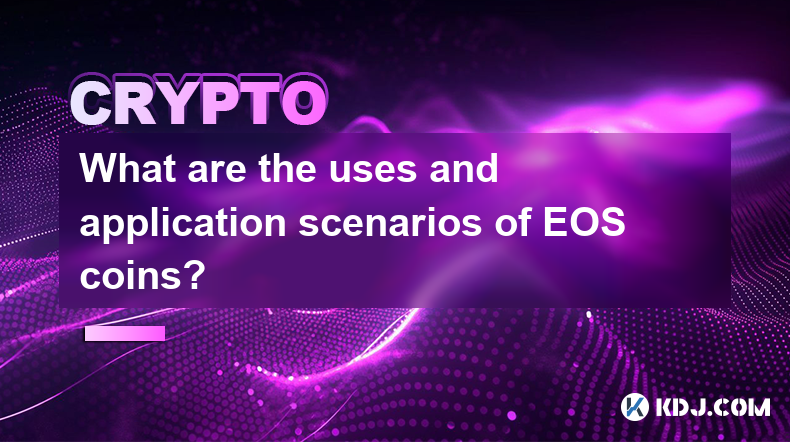
What are the uses and application scenarios of EOS coins?
Feb 26,2025 at 09:54pm
EOS: Decentralized Infrastructure for Scalable Blockchain ApplicationsKey Points:EOS enables the creation and deployment of decentralized applications with unparalleled scalability and efficiency.Its unique architecture features a high-throughput blockchain with zero transaction fees and the ability to process millions of transactions per second.EOS is ...
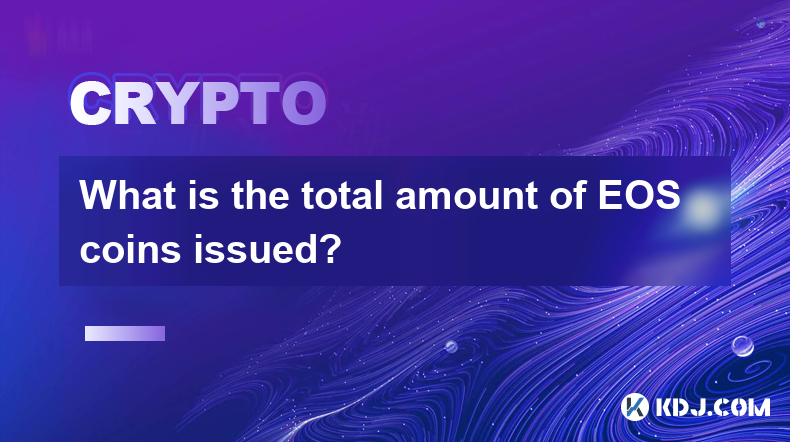
What is the total amount of EOS coins issued?
Feb 26,2025 at 06:24pm
Key PointsTotal Supply: Understand the concept of initial supply and its impact on EOS tokenomicsSupply Dynamics: Explore the various factors that affect EOS supply, including inflation and staking incentivesMarket Capitalization vs. Circulating Supply: Delve into the nuances between these metrics and their significance in token valuationDistribution an...
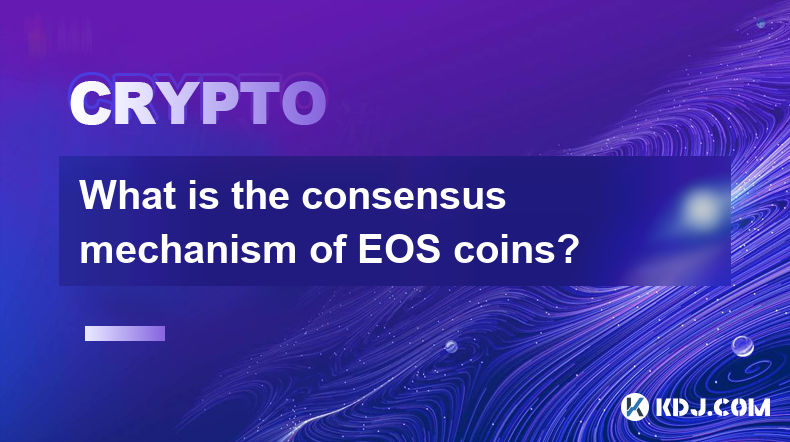
What is the consensus mechanism of EOS coins?
Feb 26,2025 at 11:19am
Key Points:EOSIO: The Foundation of EOS's Consensus MechanismDPOS: Delegated Proof-of-StakeBlock Producer ElectionsContinuous Block ProductionBlock Validation and IrreversibilityConsensus and Fork PreventionCommunity Governance and VotingWhat is the Consensus Mechanism of EOS Coins?EOS, an innovative blockchain platform, employs a unique consensus mecha...
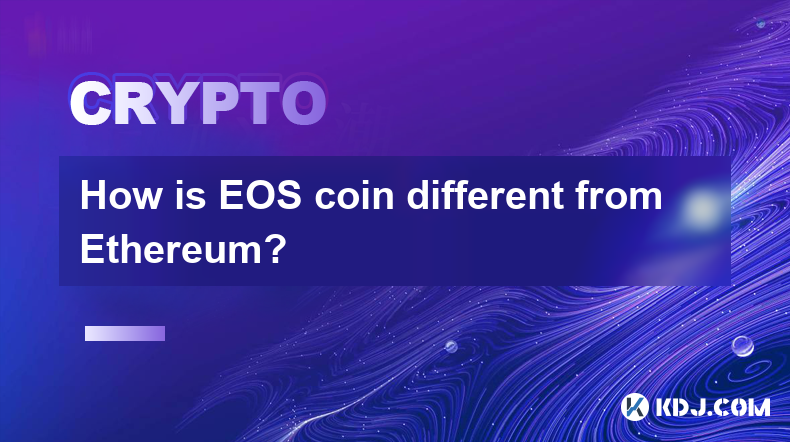
How is EOS coin different from Ethereum?
Feb 26,2025 at 10:48am
Key Points:Overview of EOS and EthereumDifferences in Consensus MechanismsAdvantages and Limitations of Each PlatformUse Cases and Target AudiencesComparison of Transaction Fees and ScalabilityCommunity Support and Development ActivityHow is EOS Coin Different from Ethereum?1. Overview of EOS and EthereumEOS and Ethereum are two of the most popular bloc...
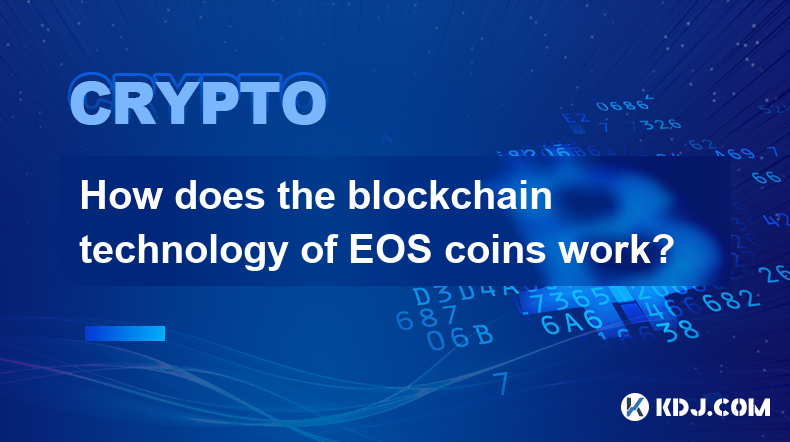
How does the blockchain technology of EOS coins work?
Feb 25,2025 at 11:13pm
Key PointsEOS is a blockchain platform that provides a high-throughput and scalable solution for decentralized applications.EOS uses a delegated proof-of-stake (DPoS) consensus mechanism to elect block producers and maintain the blockchain.EOSIO, the open-source software that powers EOS, offers a range of developer tools and features to facilitate the c...
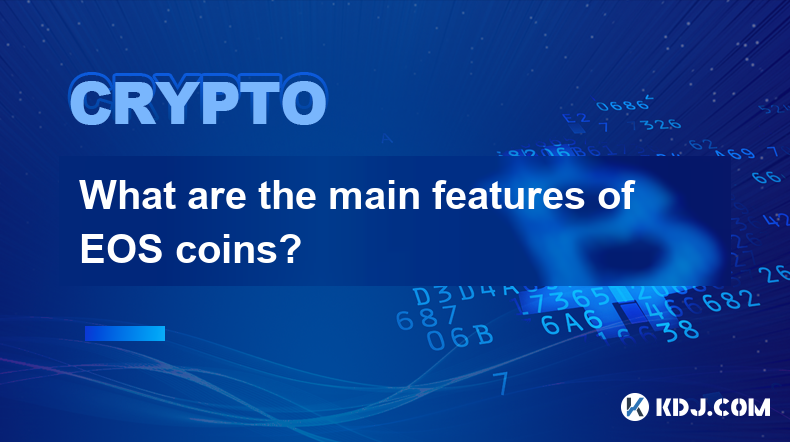
What are the main features of EOS coins?
Feb 27,2025 at 04:36pm
Key Points:EOS is a decentralized blockchain platform designed for building scalable and secure applications.EOS uses a unique consensus mechanism called Delegated Proof of Stake (DPoS), which improves transaction speed and efficiency.EOS has a robust ecosystem with a wide range of decentralized applications (dApps) and tools.EOS is known for its low tr...

What are the uses and application scenarios of EOS coins?
Feb 26,2025 at 09:54pm
EOS: Decentralized Infrastructure for Scalable Blockchain ApplicationsKey Points:EOS enables the creation and deployment of decentralized applications with unparalleled scalability and efficiency.Its unique architecture features a high-throughput blockchain with zero transaction fees and the ability to process millions of transactions per second.EOS is ...

What is the total amount of EOS coins issued?
Feb 26,2025 at 06:24pm
Key PointsTotal Supply: Understand the concept of initial supply and its impact on EOS tokenomicsSupply Dynamics: Explore the various factors that affect EOS supply, including inflation and staking incentivesMarket Capitalization vs. Circulating Supply: Delve into the nuances between these metrics and their significance in token valuationDistribution an...

What is the consensus mechanism of EOS coins?
Feb 26,2025 at 11:19am
Key Points:EOSIO: The Foundation of EOS's Consensus MechanismDPOS: Delegated Proof-of-StakeBlock Producer ElectionsContinuous Block ProductionBlock Validation and IrreversibilityConsensus and Fork PreventionCommunity Governance and VotingWhat is the Consensus Mechanism of EOS Coins?EOS, an innovative blockchain platform, employs a unique consensus mecha...

How is EOS coin different from Ethereum?
Feb 26,2025 at 10:48am
Key Points:Overview of EOS and EthereumDifferences in Consensus MechanismsAdvantages and Limitations of Each PlatformUse Cases and Target AudiencesComparison of Transaction Fees and ScalabilityCommunity Support and Development ActivityHow is EOS Coin Different from Ethereum?1. Overview of EOS and EthereumEOS and Ethereum are two of the most popular bloc...

How does the blockchain technology of EOS coins work?
Feb 25,2025 at 11:13pm
Key PointsEOS is a blockchain platform that provides a high-throughput and scalable solution for decentralized applications.EOS uses a delegated proof-of-stake (DPoS) consensus mechanism to elect block producers and maintain the blockchain.EOSIO, the open-source software that powers EOS, offers a range of developer tools and features to facilitate the c...

What are the main features of EOS coins?
Feb 27,2025 at 04:36pm
Key Points:EOS is a decentralized blockchain platform designed for building scalable and secure applications.EOS uses a unique consensus mechanism called Delegated Proof of Stake (DPoS), which improves transaction speed and efficiency.EOS has a robust ecosystem with a wide range of decentralized applications (dApps) and tools.EOS is known for its low tr...
See all articles

















































































